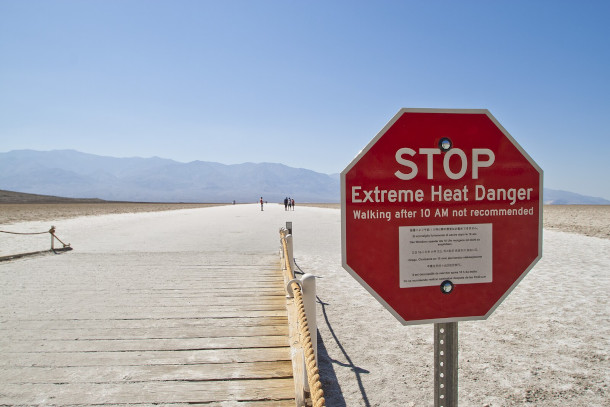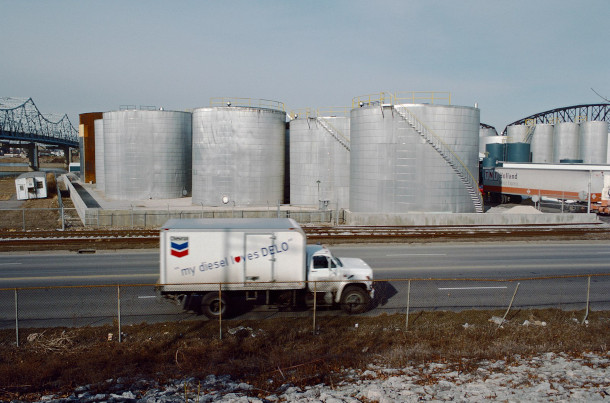Heat Waves Linked to Company Emissions
Air Date: Week of September 19, 2025

The National Oceanic and Atmospheric Administration found that over 255 million Americans were subjected to dangerous, life-threatening conditions due to extreme heat this past July. Shown here is an extreme heat warning in Death Valley, California. (Photo: Maclean, Wikimedia Commons, CC BY-SA 2.0)
New research finds that since 2010 killer heat waves have become 200 times more likely, thanks to greenhouse gas emissions, and the scientists say about half of the increase in heatwaves can be attributed to big coal, big oil, big gas and cement. Dartmouth College associate professor Justin Mankin joins Host Steve Curwood to discuss the severe economic and health consequences of extreme heat and efforts to make major carbon emitters pay for these skyrocketing costs.
Transcript
DOERING: From PRX and the Jennifer and Ted Stanley Studios at the University of Massachusetts, Boston, this is Living on Earth. I’m Jenni Doering.
CURWOOD: And I’m Steve Curwood.
Most of the killer heat waves in recent years can be blamed on the actions and products of fewer than 200 fossil fuel and cement companies, science says. A research team in Switzerland reports in the journal Nature that climate change made 213 historic heatwaves between 2000 and 2023 more likely and more intense. And since 2010 heatwaves have become 200 times more likely, thanks to greenhouse gas emissions, and the scientists say about half of the increase in heatwaves can be attributed to big coal, big oil, big gas and cement. The team admits industry emissions are underreported, and they are missing some data from less developed countries, but say the trend is clear. Joining us now from Dartmouth College is Associate Professor Justin Mankin, who published a related study in Nature earlier this year. So, Professor Mankin, tell me about this study.
MANKIN: Yeah, so this latest paper, produced by colleagues out of the Swiss institution ETH Zurich, is really part of a much longer line of what we call climate attribution research, which is the effort by climate scientists to assess cause in a complicated earth system. So what caused this heat wave, and in particular, what is the contribution of anthropogenic or human-caused greenhouse gas emissions? So what Yann and Sonia and colleagues did in this work was provide an attribution of how much individual sets of emissions from fossil fuel companies contributed to the likelihood and magnitude of that extreme heat.
CURWOOD: By the way, what's a scientific definition of a heat wave?
MANKIN: Great question. It is an elusive one. A heat wave is a weather event that can last, typically about a week, and it is anomalously warm temperatures, meaning temperatures that for that place and that time of the year are higher than you would expect them to be. So scientists have myriad definitions that they apply to characterize the magnitude of heat events. The authors of this work that we're talking about today, used a disaster database. So what they did here, cleverly, is leverage heat events that we knew had societal impact because it was recorded as a disaster, that is, emergency declarations were made, people were harmed, and that was documented via other evidence, rather than simply saying anything above 90 degrees is a heat wave, because that's simply not the case.

Heat waves affect the economy in part by reducing labor productivity, especially in sectors such as agriculture and construction. Shown above is a group of farm laborers in Palmetto, Florida. (Photo: State Library and Archives of Florida, Wikimedia Commons, Public Domain)
CURWOOD: So there are heat waves, of course, all around the world. Just here in the United States this summer, it looks like cities in the West and Southwest were hit especially hard, temperatures hitting 115 degrees Fahrenheit in places. Let's talk for a moment about the human cost of heat waves. What are we looking at? I know they're enormous.
MANKIN: Yeah, we're only beginning to fully understand the human health consequences of extreme heat. And I think that in part, is because the mortality burden of heat waves has been poorly characterized. You know, if you think back to the World Cup in soccer that, when it was held in Qatar, for example. And the deaths of the migrant laborers building the stadiums in Qatar, many of those deaths were attributed to pulmonary or cardiovascular disease and not to the extreme heat that was the proximate cause. And so extreme heat deaths are often mischaracterized, and so we rely on these large-scale epidemiological studies post hoc, after the event, in order to be able to make an assessment, often years later, of what the true mortality burden associated with these events happen to be.
CURWOOD: Professor Mankin, what do you make of this paper saying that the 14 top carbon major emitters, and we're talking about the former Soviet Union, China, Saudi Arabia, Exxon Mobil, Chevron, National Iranian Oil Company, BP, Shell, India, and a few others, what do you make of their finding that these 14 top carbon major emitters represent 30% of the total cumulative anthropogenic CO2 in the atmosphere?

Chevron Corporation was listed in this study as one of the 14 carbon majors that together emitted 30% of the total anthropogenic CO2 in the atmosphere today. (Photo: Alden, Wikimedia Commons, CC BY-SA 2.0)
MANKIN: Yeah, I would say that's likely an undercounting. We know this work to be based on this database called the Carbon Majors Database, which is a database heroically put together by a researcher named Rick Heede. And Rick poured over investor earnings calls and did documentary analysis on these company documents. And what I would say is, because we're reliant on external documents, the all likelihood means that it's an undercounting of the true scope of emissions traceable back to any one of these companies and their activities. And that's because these are not voluntary reportings coming from the companies themselves, owing to some regulation that requires them to do so.
CURWOOD: So Professor, talk to me about your research that uses climate data to both predict future warmings and understand the past events. What are some of your findings?
MANKIN: Yeah, one of the things that I think is most salient from the work that we've been doing here in my research group is that the costs of climate change to date are just far higher than we previously understood or expected. For my research group here at Dartmouth, the Climate Modeling and Impacts Group, a former PhD student and myself, Chris Callahan, we published some work that did very much the same thing, in Nature as well, in April of this past year, where we showed the contribution of individual fossil fuel companies to the economic damages from extreme heat. So that required us to do what Yann and Sonia did, but then we took it a step further and showed what the economic consequences of that extreme heat happened to be, how did that actually impact income at the local scale.
CURWOOD: Okay, so how possible is it for you to say that a certain heat wave was probably due to the emissions of this certain company?
MANKIN: I think it's extremely possible. Say, for example, there was the 2021 Pacific Northwest heat wave that struck Oregon. And one could ask the question, how would that heat wave have looked differently if we had removed some of these carbon majors' emissions from the atmosphere? How much faster would Oregon's economy have grown if that extreme heat event hadn't occurred, or, even more particular, if Chevron hadn't contributed to say, intensifying that extreme heat event? We are now at a place scientifically where we can do it, the question of culpability and responsibility is really one for civil society and for judges and courts and juries and policy makers, and these are conversations that are happening right now.
CURWOOD: So what about this question of who pays? You know, one would hope that these nearly 200 companies take much of the responsibility here if they're responsible for a majority of these heat waves. But what about this question?

Justin Mankin is a climate scientist and Associate Professor at Dartmouth College’s Department of Geography. (Photo: Courtesy of Justin Mankin)
MANKIN: Yeah, this is something that a lot of folks are contending with. But yeah, these contributions to emissions are a function of the power and profit that these companies have enjoyed in yes, absolutely, providing human well-being through energy provision, but also with these deleterious ancillary consequences, right, these consequences that were not appropriately internalized into the costs of energy itself. And I think that's the crucial piece here, and that's why a lot of states and actors are pursuing liability claims against these major fossil fuel companies. These polluters pay laws, as they're called, are being considered and often passed at the state level at this moment, are efforts by states to ask these fossil fuel companies to help pay for the losses they've endured, and in particular, also pay for their adaptation costs. The most two recent ones are New York and Vermont, where these laws exist. They're taking different approaches in each state, but the logic is the same. If you've made a mess, you're responsible for cleaning it up.
CURWOOD: Before you go, Professor, looking at this study in Nature, it would seem that there's not very much heat wave data from certain parts of the world. I'm thinking of Africa, Latin America, the Caribbean, and they mentioned that. What do you make of that? What impact do you think that would have on the research results here if they did have that data?
MANKIN: Yeah, this is an excellent question. This is a reflection of what we call data poverty. The disaster database that these authors relied on to identify extreme heat events is absolutely biased towards the high-income industrialized world, where we have rich observations and quality assurance of data. By and large, data collection is a function of the priorities and values of the data collector. There is a systematic underreporting of extreme heat and its consequences for people in the low income world. And so these places are enduring a tragedy. They are least culpable for generating the greenhouse gas emissions that are causing extreme heat right now. Those extreme heat waves are manifesting in tropical places first, because year to year and inter-annual, kind of within annual variation in temperatures is quite low in the tropics, and so a signal emerges above the noise much earlier there. So the heat impacts are kind of manifesting first. Their societies tend to be least resilient. We have the least data with which to make the assessment of what the magnitude of extreme heat happens to be in those places, and therefore we have the least ability to devise strategies for heat risk mitigation. And so that is something that a graduate student and myself are working on in the group, how do we understand the impacts of climate change in places where we don't have data? How can we improve that and help inform risk mitigation and adaptation in those places?
CURWOOD: Justin Mankin is an Associate Professor in the Department of Geography at Dartmouth College. Thank you so much for taking the time with us today.
MANKIN: Thanks for having me, Steve, I appreciate your interest in this kind of work.
Links
Read this Swiss study in Nature
Living on Earth wants to hear from you!
Living on Earth
62 Calef Highway, Suite 212
Lee, NH 03861
Telephone: 617-287-4121
E-mail: comments@loe.org
Newsletter [Click here]
Donate to Living on Earth!
Living on Earth is an independent media program and relies entirely on contributions from listeners and institutions supporting public service. Please donate now to preserve an independent environmental voice.
NewsletterLiving on Earth offers a weekly delivery of the show's rundown to your mailbox. Sign up for our newsletter today!
 Sailors For The Sea: Be the change you want to sea.
Sailors For The Sea: Be the change you want to sea.
 The Grantham Foundation for the Protection of the Environment: Committed to protecting and improving the health of the global environment.
The Grantham Foundation for the Protection of the Environment: Committed to protecting and improving the health of the global environment.
 Contribute to Living on Earth and receive, as our gift to you, an archival print of one of Mark Seth Lender's extraordinary wildlife photographs. Follow the link to see Mark's current collection of photographs.
Contribute to Living on Earth and receive, as our gift to you, an archival print of one of Mark Seth Lender's extraordinary wildlife photographs. Follow the link to see Mark's current collection of photographs.
 Buy a signed copy of Mark Seth Lender's book Smeagull the Seagull & support Living on Earth
Buy a signed copy of Mark Seth Lender's book Smeagull the Seagull & support Living on Earth

